|
The year 2020 is almost behind us. A difficult year for the whole world and, unfortunately, a very sad one for many.
This year we were in Tonga on the island until mid-November, isolated from the rest of the world, which is still fighting the Corona Virus. Tonga had immediately closed the borders and remained Corona free to this day. In the beginning they did not even let their own citizens back into the country. Some Tongans have now been allowed to enter under considerable security, but there are still thousands on the waiting list.
Nevertheless, we decided to leave "paradise" and fly to Germany. But I'm getting ahead, lets go back to the end of 2019.
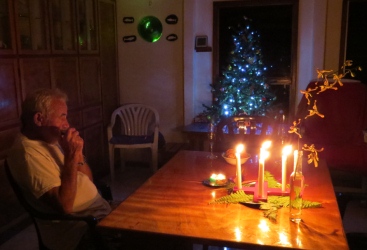 We were alone on the island, all of the neighbors traveling or staying at their alternative homes abroad. Like many, we celebrated Christmas 2019 still carefree. We were alone on the island, all of the neighbors traveling or staying at their alternative homes abroad. Like many, we celebrated Christmas 2019 still carefree.
Unfortunately, we couldn't really enjoy the peace and quiet, because the first cyclone named SARAI approached on New Year's Eve. We moored the big boat ANTAIA in the safe Hunga Lagoon. The weather reports kept changing and varied, even though they came all from New Zealand. The cyclone came much later than announced, it was very slow and therefore caused more damage. Fiji was hit pretty badly and the wind was much stronger than expected. When it reached Vava'u, SARAI had decreased significantly in strength, but was still powerful. The strongest gusts, which certainly had between 40 and 60 knots (80-120 km/h), came shortly before midnight, luckily from the West. So the boat was well protected in the Hunga lagoon, but the property suffered. Many plants and trees lost their leaves, the rest was badly affected by the salt spray, as it hardly rained. A few banana trees fell over, but nothing bad happened to us. It has been proven again, that the special location of our property is priceless. The buildings in particular are protected from North-West to East by high cliffs and on the Western side towards the lagoon by thick, tall trees. The rest of the property lies 30 meters higher.
In the night from January 1st to 2nd, I was nearly asleep at about one o'clock, when I heard a high-pitched scream. Shortly afterwards it sounded again, then it was quiet. A few minutes later the same. Our cat Puki and the dog Lulu (during the absence of the neighbors she lived with us) were both in the house. I quickly stepped into my slippers and grabbed a small flashlight, to find out, what happened. The screams came from the thick undergrowth next to the workshop building. Bushes and over knee-high, creeping vegetation and ferns, I don't like going in there even at day-light. But now I had to go and after a few steps saw white feathers behind the oleander bush. At first I was wondering how a sea bird could get here, but tom-cat Puki had caught one before and brought it to the garden. I leaned forward and saw a red comb, it was one of the white chickens, its head was tilted on its back and it was screaming pathetically. At first I thought it had got stuck in the undergrowth, but when I pushed the fronds aside, it turned out that, what I had thought was a branch, was the foot of a huge coconut crab that gripped the chicken with its mighty pincers at the chest. These pincers can bite straight through a finger, I didn't want to imagine what they were doing to the chicken in that moment. The only weapon I had was the small flashlight and this I hammered several times on the crab's armored head. Suddenly it was pitch dark, no moon, just a few stars. I stood completely naked only in slippers in the bush and in front of me a killer crab, which was maybe already coming after my toes. Carefully I worked my way backwards out of the herbaceous plants until I could feel the lawn. Then I ran with my hands streched out in front of me, so that I wouldn't crash into something, in the direction I assumed the house was. I shouted loudly for Werner to turn on the light, but then managed to get into the house in the dark without an accident and shook Werner, who was sound asleep and didn't understand first, what I wanted from him. I grabbed another flashlight and a long knife (whatever that was good for) and ran back, because I wanted to save the chicken. Werner followed suit. When I came to the bush again, the crab was still sitting in front of a pile of white feathers, the chicken was gone. Behind the place where the chicken had been sitting I could now see a nest with eggs, where the chicken must have brooded. Werner then grabbed the crab around the big pincers with both hands, that's the only way you can lift it with some degree of safety, we had learned that earlier on other islands, especially on Palmyra. The crab struggled anyway and pinched his finger with its foot. But he managed to put it on the lawn where we could look at it and take pictures. It was a great-grandmother of a coconut crab, colored blue and brown, with the largest pincers I had ever seen. Of course we let it go because they have become rare here. Werner took the eggs out of the nest. When I was back in bed, I thought, hopefully the crab won't ever come through the cat hole in the door and attack us in bed, they can climb very well. ;-))
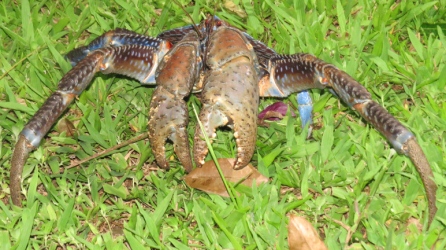 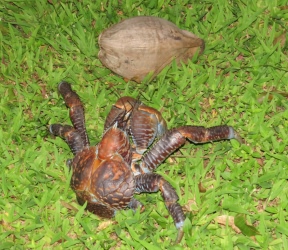 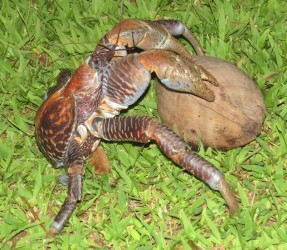
The next morning the chicken ran around again and later sat on the empty nest, it had probably not suffered any major damage and Puki inspected the undergrowth curiously.
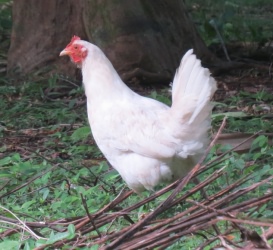 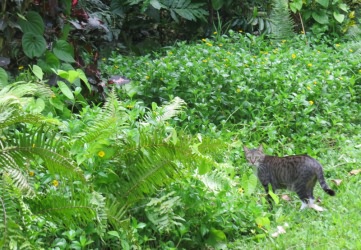
In the second week of January our new refrigerator finally arrived with the freighter from New Zealand. We picked it up by boat and were able to cool our food properly again, at over thirty degrees Celsius outside more than pleasant. The old refrigerator that we had brought to Tonga by sailing boat, practically the same model that can be operated with propane gas, 12 volts and 230 volts, was not properly cooling anymore after almost 20 years.
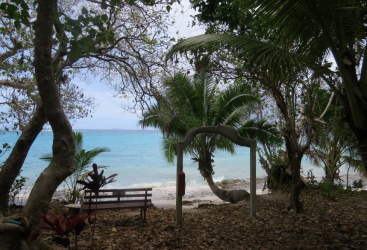
And again there was a cyclone on its way, TINO. It didn't hit us directly, but passed Vava'u on 18/19. January in the West. The wind was no problem, but the waves were immense and we had one of the highest high water levels of the year. We hadn't seen anything like this in the 26 years we've been in Vava'u. Mighty breakers rolled over the reef and onto our beach from the West. With the rising water, the waves came higher and higher on land. We had already cleared up the beach area and now tried to drag benches, dinghies, outboards and so on to a safe place. We also tried to save what was possible at our neighbours place. Everything the waves could reach was mercilessly pulled into the sea and disappeared never to be seen again. Large pieces of coral and parts of trees were thrown ashore. In the beginning Werner once underestimated the waves and was lucky, that he could stay on his feet and not be dragged into the sea.
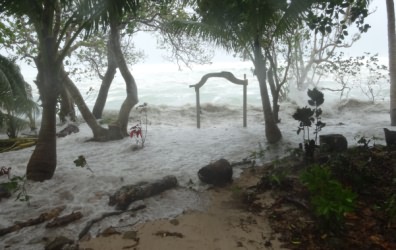 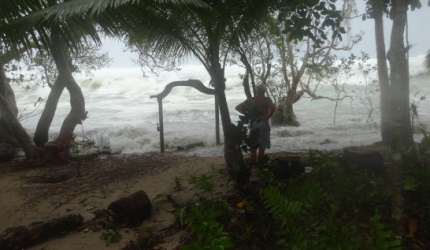 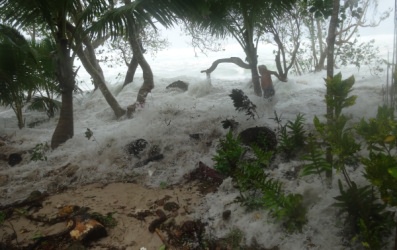
We had lashed the big wooden boat La'ā (sun) with several ropes to the pillars of the boathouse, but it broke loose and was thrown from the trailer. When we tried to retrieve it, a giant wave came, hurled the dinghy sideways, almost burying Werner under him, I was just able to cling to one of the pillars of the boathouse, the wave must have passed over my head. Werner sat soaking wet on the floor, luckily nothing had happened to him apart from a few skin abrasions. After that we decided that our wellbeing was more important and retreated into the safety of the house. The next morning, after another extreme flood in the night, the storm had moved on and the waves slowly calmed down, but we saw the destruction everywhere. A large, strong tree that stood next to the boathouse had been uprooted by the waves. It had fallen right on the roof of the boathouse, had broken through it and the wooden boat underneath. About five to ten meters of the beach zone were simply gone, together with the trees and bushes growing on it, our entrance gate with concrete posts was missing, in the concrete boat ramp was a gap of about 6 meters across the entire width. The beach zone of all our neighbours didn't look any better.
I read on the Internet that at the same time in Mallorca and the Spanish coast there were very high waves and people were dragged into the sea while taking photos, some people died. From sailors in the Caribbean we learned that there was also a very high swell there at the same time. Worldwide this high tide made itself felt, and when there is a storm at the same time, like here and in Spain, it is very destructive.
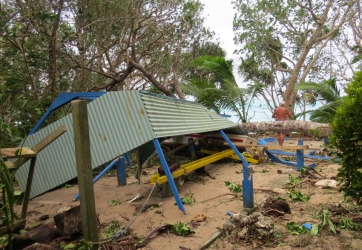 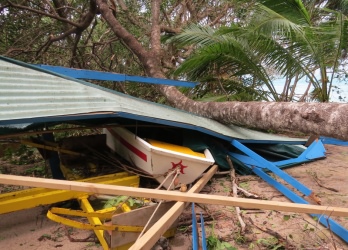 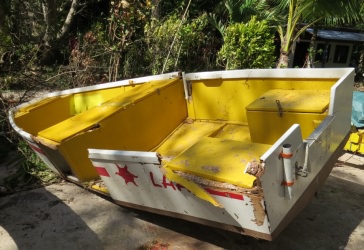
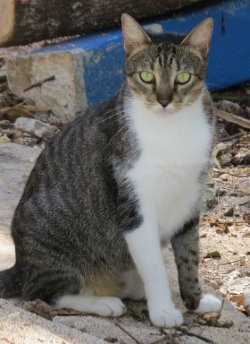
Tom-cat Puki didn't move from our side while we were cleaning up. Fortunately, we had put our big boat ANTAIA back into the Hunga Lagoon and not taken it out of the water, otherwise it would have been damaged by the uprooted tree. We were happy, when we saw that nothing had happened to her in the lagoon either. And our buildings stood high and sheltered enough, that the water never reached them.
It rained a lot in the following weeks and a few lows formed, but they did not reach us. We chopped up the fallen trees, cleared the debris. Werner built a new boat trailer for La'ā from the broken remains and repaired the boat ramp. During this time the first reports came in, that the Corona virus was spreading further from China. At the beginning of March our direct neighbors Karyn and Boris travelled from England via New Zealand to Tonga, just before the Tongan government closed the borders for good and introduced curfews at night. We didn't notice anything different on the island, but the news grew more threatening every day. A trip to Germany was out of question.
Werner tore down the remains of the boathouse and repaired the wooden boat, the wider beach wasn't that bad, just a few trees were missing and our beautifully carved entrance portal
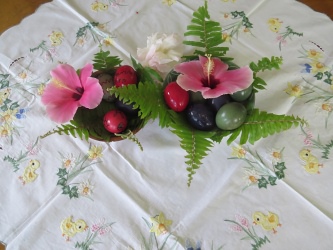
After Easter, in mid-April, very late in the season, we experienced some more anxious days. Monster cyclone HAROLD passed with speeds of up to 285 km/h over Vanuatu, parts of Fiji and along the south coast of the main island Tongatapu. In Vava'u we were at the outer rim of the storm, but still had a lot of wind. We feared that we would have flooding again, as there was an even higher high water than during Tino, but fortunately we were far enough away from the center of the storm for that. In Fiji and on the south coast of Tongatapu was a lot of damage, entire resorts and villages have been destroyed.
After that it became very quiet, we went about our daily routines, read the horror reports on the internet every morning and took care of the house and garden. La'ā was restored to her former beauty.
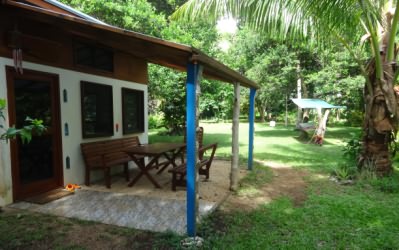 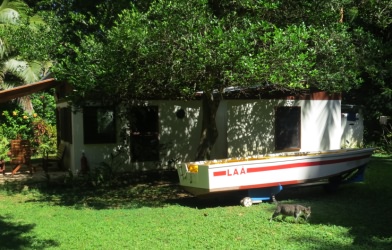 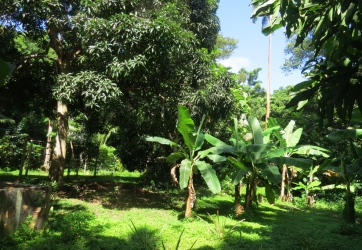
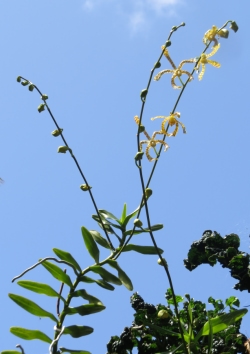
We enjoyed blooming orchids and delicious pineapples.
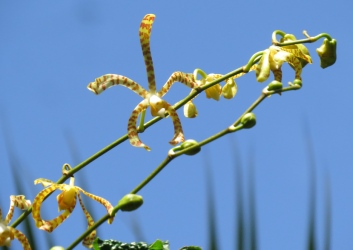 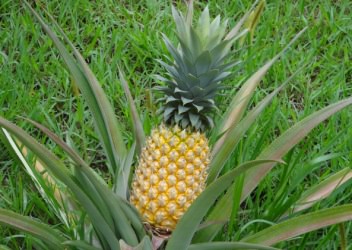
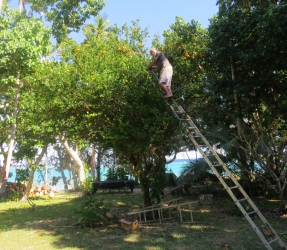 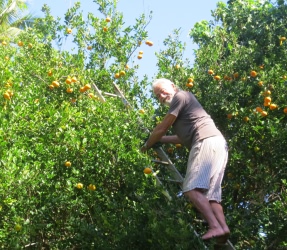
Werner harvested mandarins, called Moli in Tongan, and we canned a few bottles of juice.
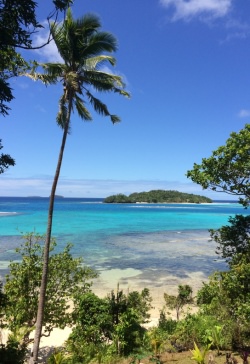
With Lulu I went for long walks across the island with wonderful views of the Blue Lagoon,
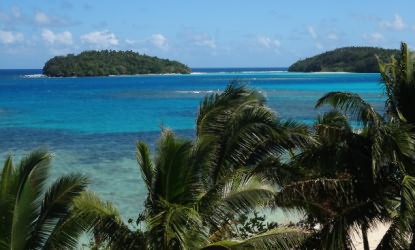 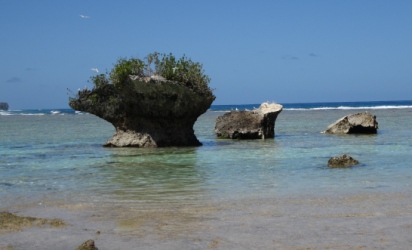
or we walked to the outer reef, where the little terns breed on the rocks and try to intimidate every intruder with a fly-by dive. Lulu was more interested in the crabs and fish that frolicked in the shallow waters of the tidal pools.
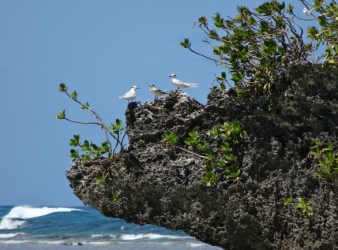 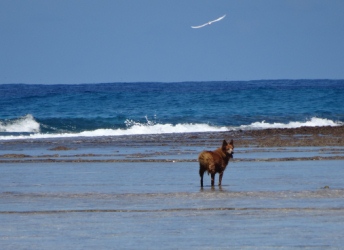 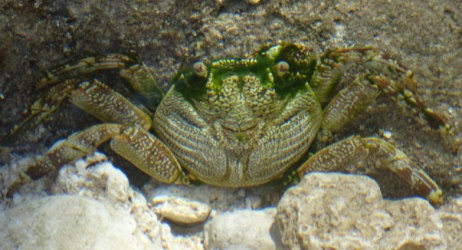
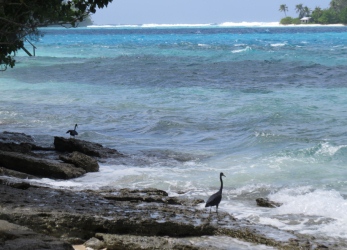 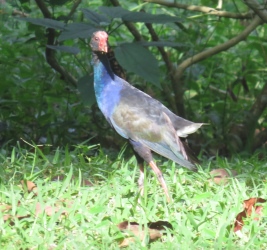 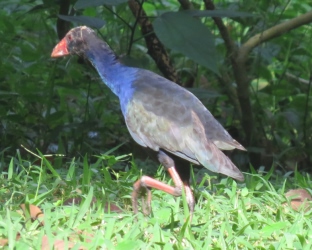
Herons fished on the beach, large, shy chicken like birds, called pukekos or swamphen, strolled through the garden and pecked at the fruits and tubers and a large stick insect made itself comfortable on and in our bucket.
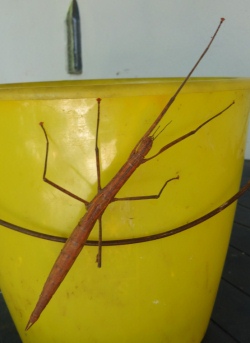 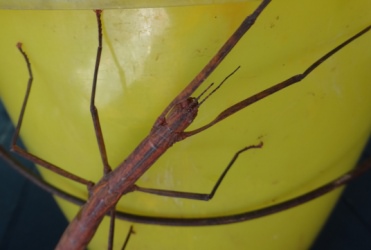
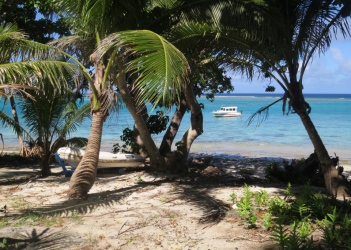 ANTAIA was moored in the lagoon in front of the beach, the weather was wonderful. Only when it was absolutely necessary, we went in ANTAIA to the city of Neiafu for shopping. It all felt so surreal. No tourists, no sailors, except for the few who had been here and now couldn't move on. All over the world, sailors were stuck, the limitless freedom had been rigorously curtailed. Many boats from the Caribbean made their way back to Europe, helped by the Trans-Ocean Association and Intermar. Here in the Pacific they had to stay where they were, none of the islands would let anyone in. Some tried anyway, but were mercilessly turned away in Tonga and had to move on. 3,000 Tongans abroad are on a waiting list and only very few were allowed back into the country under very strict security requirements such as several tests and a two-week quarantine in a special hotel. ANTAIA was moored in the lagoon in front of the beach, the weather was wonderful. Only when it was absolutely necessary, we went in ANTAIA to the city of Neiafu for shopping. It all felt so surreal. No tourists, no sailors, except for the few who had been here and now couldn't move on. All over the world, sailors were stuck, the limitless freedom had been rigorously curtailed. Many boats from the Caribbean made their way back to Europe, helped by the Trans-Ocean Association and Intermar. Here in the Pacific they had to stay where they were, none of the islands would let anyone in. Some tried anyway, but were mercilessly turned away in Tonga and had to move on. 3,000 Tongans abroad are on a waiting list and only very few were allowed back into the country under very strict security requirements such as several tests and a two-week quarantine in a special hotel.
In August I booked one-way flights for mid-November from Tongatapu via Auckland and Qatar to Munich with the American Express travel service. This was the only way to ensure that we had all flights on one ticket, because only short transit stays were permitted everywhere. We hoped, that it was still possible to fly in November. Also it was not yet clear, how we would get from Vava'u to Tongatapu, as the national airline REAL Tonga had been discontinued and a new airline was planned but had not started to fly. We wanted to take the ferry anyway, because we could take 30 kg of luggage each on the international flights, but the national route only allowed 15 kg per person and the excess baggage was very expensive.
The departure times and days changed several times, from Wednesday 11/11 to Tuesday, then to Thursday. In Auckland, it was only allowed to be in transit for less than 24 hours, nothing else was possible. One week before departure, the direct flight from Auckland to Qatar, which was supposed to last 20 hours, was canceled, but a flight with a technical stopover in Brisbane, Australia was added.
Since we didn't know when we would be allowed to enter Tonga again, we secured the house more thoroughly than usual. Especially since our neighbors wanted to travel to New Zealand a few weeks after us, to see their children, who have been stuck there for months. They have permanent residency in New Zealand, so they are allowed in, but they have been under strict quarantine in a hotel in Auckland for two weeks.
ANTAIA was pulled out of the water on her trailer with the electric winch and we covered her in a huge tarpaulin.
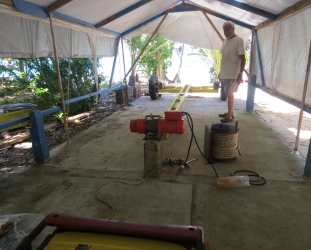 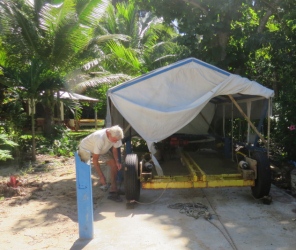 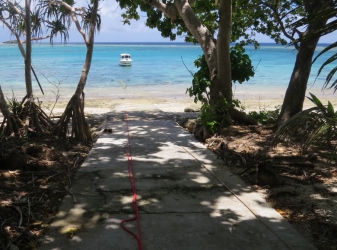 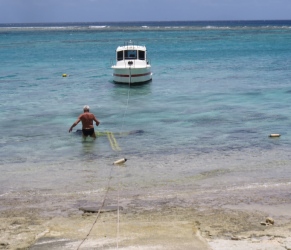 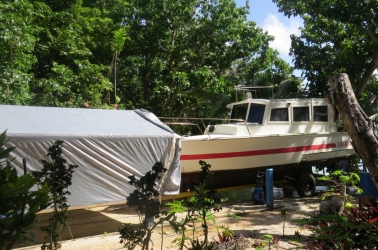
Of course everything went differently than planned, the ferry changed its timetable in the week we wanted to go and we had to fly from Vava'u to Tongatapu. One last look at Fofoa and the Blue Lagoon with Foiata and Foelifuka, then Vava'u disappeared into the clouds. The atolls of the Ha'apai group could also be seen quite well from above.
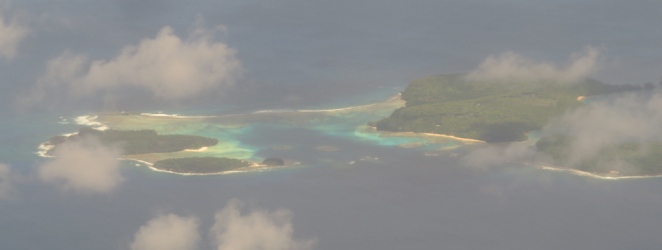 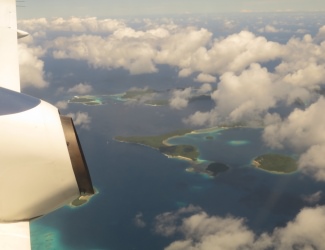 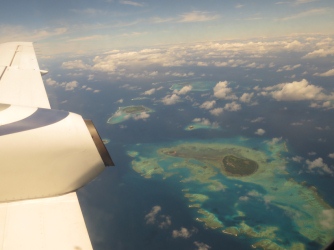
Fortunately, Fiona, the very nice manager of the ALOFT Bed and Breakfast Hotel near the national airport in Tongatapu remembered us and rented us a room. (See our exciting stay there during a cyclone - Report 2018) She even picked us up from the national airport and took us to the international airport the next day, where we arrived three hours before departure. Luckily! Normally you can get through the small airport in half an hour to an hour, despite the considerable crowd, but this time everything was completely different. When we arrived, the airport was empty, only one couple was there. A few people arrived later. So we were the second couple to check in. The friendly airport staff told us, that they have to make a call to New Zealand for every passenger, to get a special permit to fly. The mandatory electronic NZEta, i.e. the notification that we would come to New Zealand and would only be in transit, I had already submitted months ago, but this additional procedure was still required. Then it became hectic and stressful. The first flight from Tongatapu to Auckland was operated by Air New Zealand, and they had missed the last change Qatar Airlines had made to the ticket. Since, in their eyes, the connecting flight was not secured, we could not fly. I showed them the new ticket with the flight change, the transit in Auckland was even shorter than before. I begged them to make sure we could fly. At least four people were busy to make calls to New Zealand because of us. At the same time, the remaining 20 or 30 passengers for this flight were checked in and disappeared one after the other in the departure hall. At last we were the only ones left outside and we waited ... and waited. It became more and more uncomfortable, we saw ourselves already on the way back to Vava'u. The plane landed, the departure time was getting closer and closer. Finally, about 10 minutes before the scheduled departure time, we were told, that at least my ticket was ok. And then New Zealand gave me permission to fly. Werner stood beside me and was very excited, of course I would not have flown without him. More phone calls and finally, finally, the double ok came for him too, and we could grab our hand luggage and rush to the security area. X-ray control of hand luggage, passport control, we stormed into the departure lounge and thought everyone was already on the plane, but all passengers were still sitting there.
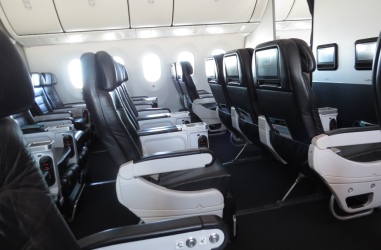 Thanks to our booking with American Express and despite the cheap tickets, we had Premium seats with Air New Zealand, and we were the first to board the plane and the only ones to sit in the empty Premium class, two stewardesses bustling around us. As a welcome they served us sparkling wine in real glasses, then a starter with salmon, a good lunch accompanied by a nice wine, and ice cream and coffee for dessert. Instead of the usual plastic dishes and cutlery, the meals were served in china and with stainless steel cutlery. One could get used to this ;-) Thanks to our booking with American Express and despite the cheap tickets, we had Premium seats with Air New Zealand, and we were the first to board the plane and the only ones to sit in the empty Premium class, two stewardesses bustling around us. As a welcome they served us sparkling wine in real glasses, then a starter with salmon, a good lunch accompanied by a nice wine, and ice cream and coffee for dessert. Instead of the usual plastic dishes and cutlery, the meals were served in china and with stainless steel cutlery. One could get used to this ;-)
The flight took only three hours. In Auckland, New Zealand, we had to go through the whole security check again despite being in transit and less than two hours later, at 8 p.m. we were already back in the air, this time in Economy class with Qatar Airlines. We had received rubber gloves to wear and, in addition to the face mask, a board in front of our head ... uh, transparent plastic shield ... , with the requirement to wear it during the whole flight, except when eating. This plane was occupied about 10 percent, so everybody had three seats to stretch out. In Brisbane, Australia, we had to leave the plane unexpectedly and had to go through security again. The Australians have new body scanners that even recognize a handkerchief in a pocket. Despite being asked to empty my pockets, I hadn't thought of the handkerchief and was promptly reprimanded and sent through the scanner again. After a short stay, we boarded for the longest flight, which was originally supposed to last more than 20 hours without a stopover, now it was only 14 hours, easy with so much space.
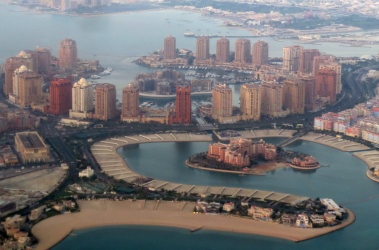 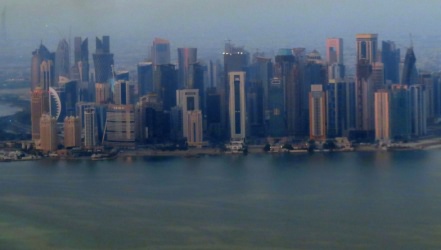
On the approach to Doha, the capital of Qatar, we saw in the haze residential complexes in all possible configurations built on a lot of water and sand. It's a shame, we had to go on, we would have liked to stop here for a few days.
After landing in Qatar, we went throught the well-known game of security checks again. Unpacking the laptop and tablets, camera, etc., taking off the belt and jacket, placing everything in the trays...waiting, going through the electronic gate, taking everything off the trays, putting everything back on and packing up again. And then we were already on our way back to the plane, of course with gloves, face mask and face shield.
The daytime flight over the Arabian Peninsula was very interesting. After seeing a lot of sea and sand with oil ports and production areas, we flew over landscapes and places whose names are otherwise only known from the news or the Bible, Euphrates and Tigris, Kuwait, Baghdad and Mosul. We flew over the city of Arbil, built in a circle and thought of Karl May's books, when we saw the highlands of Kurdistan. We marveled at the rugged mountains and dry valleys, the snow-capped peaks of the Armenian highlands, where the mountain Arafat rises over 5000 m high between many four thousand meter peaks. Unfortunately, because of the great distance, we could not see the remains of the ark ;-)
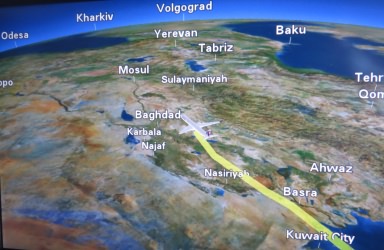 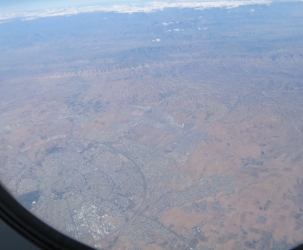 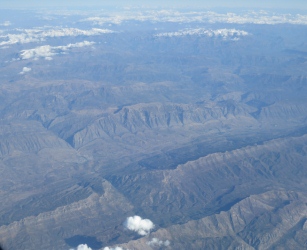 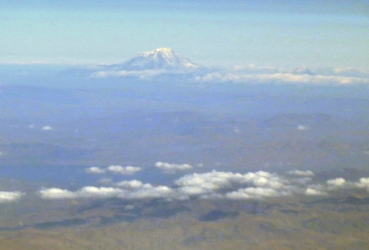
The Alps near Munich were no less beautiful, and we wondered what to expect, when we arrived in Munich, Germany, but our arrival was very uneventful. A machine read our passports, two officers sat in glass cases and watched everything. The few suitcases arrived quickly, we grabbed our two and walked outside past a lonely woman sitting on a chair and watching the passengers. The airport was empty, almost all shops closed. We picked up our rental car key from Europcar and found the car in the basement. I had ordered a VW Golf, but we got a bigger car, a SKODA with all sorts of modern frills. There wasn't even an ignition key anymore. It took us a full quarter of an hour to be able to drive off, and I felt a bit stupid. At least I was able to program the navigation system and Werner drove the first half, and I could tell him, where to go. Once on the Autobahn to Stuttgart it was easy, then I drove and we arrived in Wurmlingen shortly before dusk.
In the meantime we have already completed several doctor's appointments and got used to wearing the mask. On December 1st, we had the first 10 centimeter of snow, the first time for us in many years.
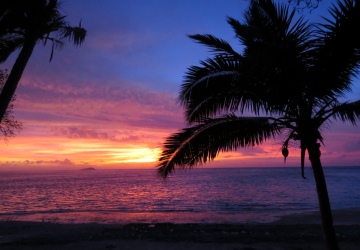
On December 14th we celebrated our 30th wedding anniversary only with the closest family members and at Christmas it will be the same.
At the moment, the sunset at the Blue Lagoon is just a nice memory.
|



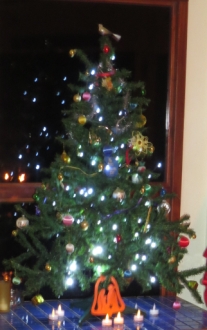
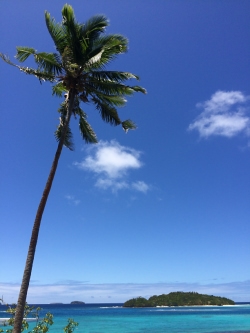 MERRY CHRISTMAS
MERRY CHRISTMAS